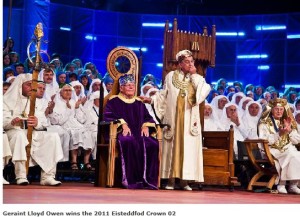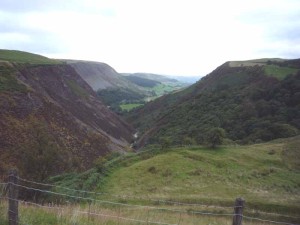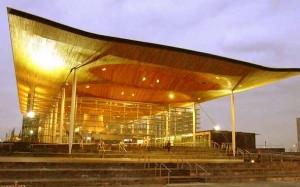By Alan Clawley.
A few weeks before the English riots broke out I was invited by a friend to spend a day at the Welsh National Eistedfodd which this year was held in a field outside Wrexham. The people on the coach from Birmingham all spoke Welsh at various levels, but my only knowledge of the language had been picked up mainly from climbing the Welsh mountains. We did, however, have singing in common and a few of us sang in the Birmingham Festival Chorus.
Why, I asked my neighbour on the coach, were the Welsh such a singing nation? Because, she replied, they were too poor to own musical instruments so they sang instead. My theory was that the close harmony of the male voice choir comes from the sense of community derived from a lifetime spent underground in the coal mine and that its rise and fall, ebb and flow, was inspired by the dramatic ups and downs of the Welsh mountains. Singing comes naturally to the Welsh. Everyone does it. As a pupil for a short while in a Welsh-speaking school my English wife learnt Welsh songs and sang with the entire school. There was no separate ‘choir’ for pupils who could sing because everyone was considered a singer. When she moved to a Liverpool school and was asked if she sang in the choir she said ‘no’ because there wasn’t one as such.
When we got off the coach at Wrexham I was impressed by the huge scale of the event. The main tent was bigger than any circus I have ever seen, with a brightly lit stage and raked seating. Outside there were hundreds of stalls of all kinds some of which were sponsored by the Welsh government. I could think of no English parallel.
The Eistedfodd is primarily a competition, which means sitting through several renderings of the same piece by different groups or individuals.
The first acts I saw and heard were male-voice groups who traipsed on and off the stage and performed with studied nonchalance as if just doing a day’s work. Some reinforced the workaday image by adopting denim jeans as their ‘uniform’. In contrast the women wore smart ‘Women’s Institute’ casual from the latest catalogues. The men tended to favour women musical directors whilst the women preferred men to be in charge. The best male groups were definitely led by the more emotionally expressive women. I was most moved by the Over-Sixties Solo Hymn Singing – musically unsophisticated but powerfully evocative of the Welsh chapel and my own Salvation Army background
The Women’s Choral Speaking, is as far as I know, unique to Wales. I suspect it was a way in which the women could do their own thing in a group about the same size as a small male-voice choir. A piece if prose or poetry is recited in strict unison in the natural pitch of the individual voices and without a conductor. One group of younger women choreographed their recital. Impressive skills of co-ordination but reminiscent of the spoof Greek Tragedy oratorios in Woody Allen’s ‘The Mighty Aphrodite’.
Outside the big tent I was intrigued to see CADW, the official Welsh heritage body next door to the Welsh national monuments body. In England these are combined as English Heritage but in Wales they are still separate. According to a member of staff there are no cuts being made as there are in English Heritage.
I left it too late to get into the closing ceremony in the main tent, the Chairing of the Bard, a ceremony that goes back to 1176, although the modern version is 19th century. The best work in strict verse wins the Chair and the best work in free verse wins the Crown. The sound of a full house of Welsh people singing ‘Mae Hen Wlad Fy Nhadau’ could hardly be matched by an English crowd singing ‘Jerusalem’, the nearest thing to an English National Anthem.
 England differs from Wales in that it doesn’t have its own national assembly like the Welsh ‘Senedd’. Perhaps without a clear national identity the Welsh Assembly would not have happened in the first place but once it did it brought social, economic and cultural benefits to the Welsh nation. Support for the National Eisteddfod is the most obvious example. I began to wonder if the English were feeling a bit left out.
England differs from Wales in that it doesn’t have its own national assembly like the Welsh ‘Senedd’. Perhaps without a clear national identity the Welsh Assembly would not have happened in the first place but once it did it brought social, economic and cultural benefits to the Welsh nation. Support for the National Eisteddfod is the most obvious example. I began to wonder if the English were feeling a bit left out.





